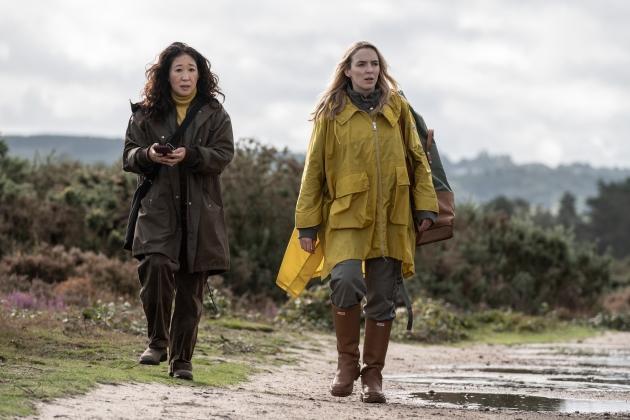
SPOILER ALERT: Do not read if you haven’t seen the series finale of “Killing Eve” (“Hello, Losers”), which aired Sunday, April 10 on BBC America and AMC Plus.
In their last confrontation, Eve (Sandra Oh) and Carolyn (Fiona Shaw) sit perfectly still in an unassuming pub, eyeing the other with wary disdain as Villanelle (Jodie Comer) plays darts in the other room. “One of the great unspoken truths about life, Eve, is that people behave exactly as you expect them to,” Carolyn finally says. “Take you, for example. You’re about to embark on some mad endgame when you know, deep down, you’re just a woman who likes an inappropriately timed croissant on a Sunday morning.”
More from Variety
As Carolyn almost certainly expected, Eve counters: “And you are going to race me to it, even though you know deep down, you don’t have an excuse anymore.” She’s right — or at least she was, before Carolyn decides to pull a more contrarian move.
“I was going to do that, yes,” Carolyn allows. “But now I’m going to behave exactly as you’d expect me to — and do something different.”
As I watched the baffling final sequence of “Killing Eve,” I thought back to this exchange and wondered if this particular flavor of defiance was the show’s goal all along. Over four seasons, it spent much of its time and energy subverting spy stories and making genuinely shocking choices that left viewers reeling. In its last few minutes, though, the show goes in such a completely typical direction that it’s almost more jarring for it. After the series finale finally lets Villanelle and Eve consummate their long simmering sexual tension and bring down The Twelve, it almost immediately pivots to someone murdering Villanelle in cold blood as Eve stares on in horror.
The whole thing is so abrupt, so hackneyed, so amazingly unoriginal that for one hopeful minute, I was sure it had to be a trick. But no: “Killing Eve” really ends with Villanelle drifting away into the Thames, Jack in “Titanic” style, as Eve screams into the night. When the show’s signature block lettering slams “THE END” onto the screen, it’s so jarring that it feels like a slap in the face.
If I were to give the show the benefit of the doubt, I’d say that it made such a cliché choice on purpose. Like Carolyn, maybe Season 4 showrunner Laura Neal (who wrote the series finale) wanted to surprise people by not surprising people. Pulling off such a move, however, requires some serious finesse that this blunt force trauma of an ending just doesn’t have.
Anyone who’s seen a single spy thriller could have called this “twist” from a mile away. Hell, anyone who’s gotten invested in a TV love story between two queer women should’ve been steeling themselves for tragedy the second Eve and Villanelle finally found some semblance of happiness. Granted, this particular couple was made up of a rogue assassin and spy who flirted with death even more than each other. This ending working wouldn’t necessarily have come down to both of them making it out alive. But if one or both of them were going to end the series dead, Eve stepping back from an embrace only to see Villanelle blinking through a gunshot wound is as boring a death scene as it gets. (See also: “Buffy the Vampire Slayer” infamously killing off Tara in much the same way over 20 years ago.) For as much as the swelling music and harrowing shots of Villanelle’s corpse floating away tried to underline the drama of the moment, it was way too predictable to be at all effective. This absolute most basic way to end an otherwise complex story just made everything that came before it seem like an enormous tease.
“Killing Eve” has always presented a challenge for whichever showrunner took it over from season to season as if running a particularly tricky relay race. After creator Phoebe Waller-Bridge left the first season on a huge cliffhanger before leaving the show itself, it can’t have been easy for Emerald Fennell to pick up where she left off, let alone move the narrative past Eve stabbing Villanelle in the gut. Over time, as was probably inevitable given the constant turnover, the series became more and more convoluted, introducing new mythology and complications that never quite gelled.
But in its most rewarding moments, the show nevertheless delighted in keeping its audience in suspense by avoiding the most expected bends in the road to discover more intriguing avenues beyond. With a chaotic assassin and the woman who can’t help but admire her at its center, “Killing Eve” was at its best when peeling back a layer no one even realized was there to reveal something more knotted and fascinating therein. It delighted in the erotic and macabre, unearthing jokes in the most unexpected (and even downright disgusting) places. It explored female desire in its rawest, most dangerous forms without dismissing it. It drew such sharp portraits of women yearning for more — for life, for death, for every wonderful and terrible moment in between — that they drew blood.
When it was good, “Killing Eve” was smart, sexy, and truly shocking. Its tedious ending, echoing too many other disappointing conclusions, achieves none of that. Instead, the show gives its once vibrant characters a dull sendoff that, if nothing else, would’ve once made them yawn.
Best of Variety
Sign up for Variety’s Newsletter. For the latest news, follow us on Facebook, Twitter, and Instagram.




